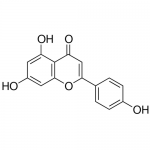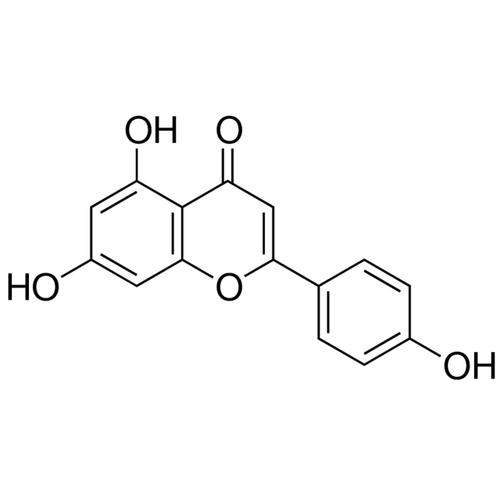| Product Name | Apigenin |
| Description |
Protein kinase inhibitor |
| Purity | >98% |
| CAS No. | 520-36-5 |
| Molecular Formula | C15H10O5 |
| Molecular Weight | 270.2 |
| Field of Use | Not for use in humans. Not for use in diagnostics or therapeutics. For in vitro research use only. |
Properties
| Storage Temperature | -20ºC |
| Shipping Temperature | Shipped Ambient |
| Product Type | Inhibitor |
| Solubility | Soluble to 50 mM in DMSO |
| Source | Synthetic |
| Appearance | White Solid |
| SMILES | C1=CC(=CC=C1C2=CC(=O)C3=C(C=C(C=C3O2)O)O)O |
| InChI | InChI=1S/C15H10O5/c16-9-3-1-8(2-4-9)13-7-12(19)15-11(18)5-10(17)6-14(15)20-13/h1-7,16-18H |
| InChIKey | KZNIFHPLKGYRTM-UHFFFAOYSA-N |
| Safety Phrases |
Classification: Harmful. May be harmful if inhaled, swallowed or absorbed through skin. Safety Phrases: S22 - Do not breathe dust S24/25 - Avoid contact with skin and eyes S36/37/39 - Wear suitable protective clothing, gloves and eye/face protection Risk Phrases: R68 - Possible risk of irreversible effects |
| Cite This Product | Apigenin (StressMarq Biosciences Inc., Victoria BC CANADA, Catalog # SIH-249) |
Biological Description
| Alternative Names | 5,7-Dihydroxy-2-(4-hydroxyphenyl)-4H-chromen-4-one |
| Research Areas | Apoptosis, Cancer, Cancer Growth Inhibitors, Tyrosine Kinase Inhibitors |
| PubChem ID | 5280443 |
| Scientific Background | Apigenin induces a process called autophagia (1). It is a potent inhibitor of CYP2C9, an enzyme responsible for the metabolism of many pharmaceutical drugs in the body (2). Apigenin has also been shown to reverse the adverse effects of cyclosporine (3). |
| References |
1. Ruela-de-Sousa R.R., et al. (2010) Cell Death and Disease. 1(e19): 1-11. 2. Dayong S.I., et al. (2009) Drug Metabolism and Disposition. 37(3): 629-634. 3. Chakravarthi S., Wen C.F., Nagaraja H.S. (2009) J Anal Bio Sci. 32(4): 320-327. |



Reviews
There are no reviews yet.